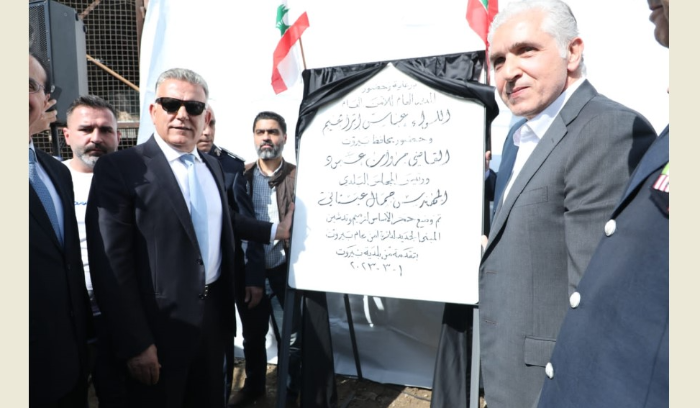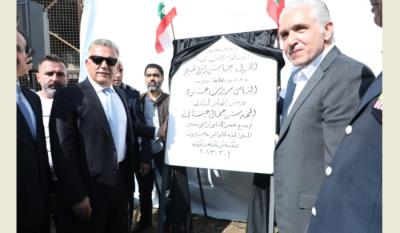The Director General of General Security, Major General Abbas Ibrahim, laid the foundation stone for the new General Security Building in the Karantina area near the Beirut Fire Brigade. He emphasized that "my national and practical duty compels me to be in any position that serves people and their rights, facilitates their transactions, and shortens the timelines imposed by administrative routine. These goals have formed the main points in the developmental plans I have established since taking responsibility at the General Directorate of General Security."
He continued, "Before I begin my speech, and in light of the enormity of the catastrophe that struck the Port of Beirut, I bow before the souls of the martyrs who fell, and the wounded who have suffered and continue to do so, and before every citizen who has lost a loved one. This city owes us much; how could it not, as it is the capital of sacrifice, martyrdom, and martyrs."
He clarified that "this headquarters is part of the developmental policy and growth strategy that the Directorate has adopted for twelve years. The construction of this building responds to the needs of the city and its citizens, where the mission of its military personnel, along with other General Security departments and centers spread across Lebanon and along border crossings, is to stand by the people, maintain the country's security, and ensure stability and civil peace, reinforcing the pillars of the state despite its current struggles, as the state remains the first and last refuge for the Lebanese."
He stated, "What we have done and continue to do is a very small part of what we should offer to our people who deserve institutions and official administrations that befit their history and sacrifices, and senior officials who work for the benefit of the country and its citizens, rather than being distracted by disputes that have led the country and its people to the most perilous depths of poverty and the absence of all means for a decent life."
He added, "Lebanon and freedom are inseparable; Lebanon has risen and developed through freedom, and it cannot live and exist as a country and state without it. Freedom is the guarantee of Lebanon’s pluralism, as well as its political, sectarian, cultural, and regional diversity and lifestyles. There is no meaning to Lebanon without freedom, there is no existence for it, and there is no life for the Lebanese outside the space of freedom."
He continued, "Through freedom, we have triumphed over terrorism and sectarian strife and against all who oppose the homeland; through freedom, we have defeated the Israeli enemy, and through freedom, we must fortify our Lebanese unity and rebuild on solid foundations. Without it, it will be easier for our enemies to attempt again to subjugate Lebanon and the Lebanese and put them in a reality they reject in its essence and all its causes."
He stated, "The avenues for meeting for goodness, righteousness, and reform will widen; in the journey of those who have dedicated themselves to serving the homeland, there is no place for retirement or neglect. Today we laid the foundation stone for a center among the dozens of centers that have risen and opened their doors to serve the Lebanese, and tomorrow we will continue our journey in various other fields to elevate the status of Lebanon, as it once was—a thriving civilization of openness and creativity across the globe. Together, we will restore it to what it was and even better, and all this will not be achieved except through dialogue, rejecting hatred and violence, and upholding national unity."
He concluded, "I would like to thank everyone who contributed to securing this building, and those who provided material and logistical support, especially the Governor of Beirut, the Mayor and members of its municipal council, and the United Nations agencies." Major General Ibrahim presented honorary shields to Governor Aboud, Mayor Aytani, and the representative of the UN High Commissioner for Refugees.
The ceremony was attended by individuals including Wadah Al-Sadek, Jean Talouzian, Adnan Tarablosi, Amin Sheri, Faisal Al-Sayegh, Ghassan Hasbani, and Nicolas Sahnaoui, along with the Governor of Beirut, Judge Marwan Aboud, and the Mayor of Beirut, Jamal Aytani, and members of the municipal council.




